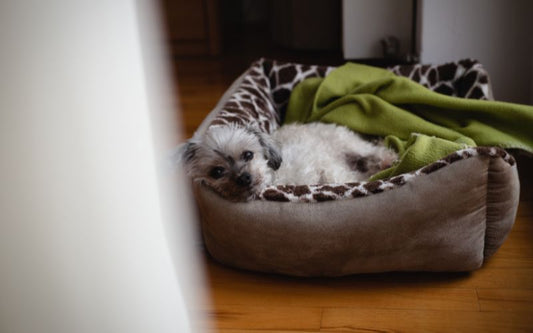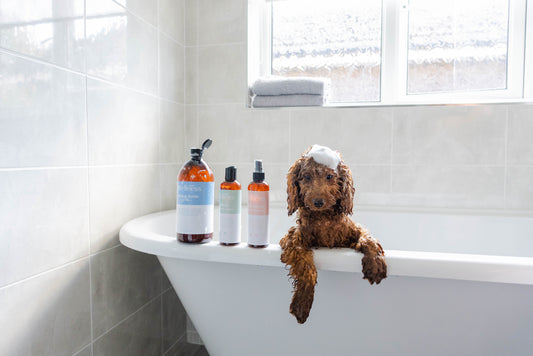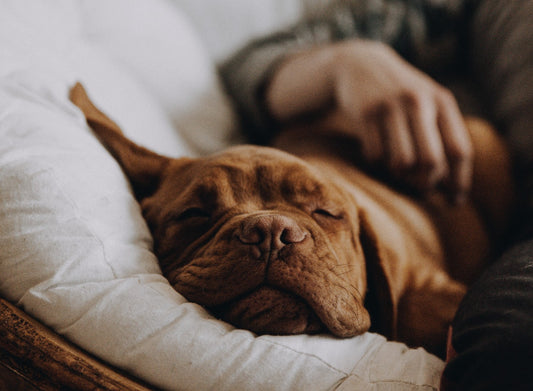There’s no better feeling than waking up from a good night’s sleep feeling ready to tackle the day.
Sleep is important for us in so many ways, and it's important for our furry friends too!
As a new dog owner, you may be wondering where your dog should sleep at night, and if you are asking yourself this - then know that you're not alone!
Some dogs will love the couch, some will love a cold floor by the door, and some will be fine settling in their crate all night.
Always remember that there’s no one-size-fits-all rule, and what works for one family, may not work for the other.
If you're a new dog owner, our general guide is a great starting point for helping you better understand and manage your pup's sleeping habits:
- Where should dogs sleep?
- Where should puppies sleep?
- Leaving a dog downstairs
- Crate training
- Sleeping in the bedroom

Where should dogs sleep at night?
The search for the perfect sleeping spot will depend on you and your furry friend.
It all comes down to personal preference and the needs of your dog, ensuring you find somewhere that they feel comfortable and safe.
Most adult dogs will be able to sleep anywhere in the house, you just need to make sure you choose a spot your pup feels happy and at home.
Bedroom or downstairs?
Some dog owners will think nothing about letting their dog have full run of the house, while others will prefer them to stay downstairs.
For me, I live alone, and my pup Roux is slightly anxious so the company of having her sleep in my room works well for us both.
But if you have two dogs, you may find they keep each other company and allow you to have a peaceful sleep.
I have friends who let their dog wander through the night, moving from a crate in their room, to the sofa downstairs, or a spot at the top of the stairs.
For light sleepers, this may sound like a very restless night. And if your dog barks through the night, you may find they're better being contained to one quiet room.
Dog crate or bed?
Regardless of the style of bed, most dogs like having a place or two they can call their own - which is why investing in a dog bed or crate is important.
It’s recommended to crate train your puppy from day one, as this can be useful with their overall training, but once fully trained you may find your dog prefers sleeping away from their crate, in a bed or a cosy spot on the sofa.
Pay attention to where they settle during the day, and use this to help you decide where they could sleep at night.

Where should puppies sleep?
Young dogs have endless amounts of energy - spending most of their time snuggling, playing or zooming their way round their new home!
In the early days before puppies start to calm down, there’s bound to be a little mischievous behaviour thrown in for good measure!
All of this makes rest so much more important for them, and on average puppies need 18 - 20 hours of sleep each day. Which begs the question, where should your puppy sleep for afternoon naps or an evening snooze?
The best place for a puppy to sleep when you’ve just welcomed them home is often considered to be a crate.
A crate provides a safe and enclosed space for them to settle, while also containing any accidents to one space and keeping them away from potential dangers when you’re trying to catch up on some much needed shut eye.
💡 Top Tip: It’s one of the essential puppy accessories you’ll need to buy before pup arrives home.
The first few nights are likely to be unsettling for your new pup, so keep them close - by your bed or in eye line - to give them the comfort they need. This will also allow you to hear when they wake for their inevitable toilet breaks.
After a week of sleeping through the night, you’ll be able to start moving their crate further and further away from your bed, until you reach the desired sleep space.
It’s best to find a space that is relatively quiet and away from potential disruptions, all in the hope of guaranteeing a restful sleep for you both.
If you find yourself asking ‘when is a puppy ready to sleep out of a crate?’, most will be fine by the time they reach 7 - 8 months.
At this age, you’ll want to make sure they are sleeping through the night and no longer waking you or having accidents, but also that they’ve come through their teething stage and will not start destroying the house.
Try not to rush the process, and go at your puppy’s individual pace to avoid causing them any unnecessary stress. A happy pup is a happy (and rested) home after all!
What to put in a puppy crate at night?
Make a puppy's crate comfortable is an important way to help them settle through the night.
🐻 A puppy-safe teddy bear they can snuggle up to, or an item of clothing or blanket that smells like you is a great way to help a puppy feel comforted in new surroundings.
🎵 You could also play white noise on a low volume to break up the silence and help them relax.
Leaving dogs downstairs at night:
To some people, the thought of leaving dogs downstairs at night will seem like a cruel thing to do, while others won't even question it!
Not only can leaving a dog downstairs at night help give you a more peaceful sleep, there are lots of additional benefits for both you and your four-legged friend:
- Establish Routine & House Rules: Help your dog understand which areas they're allowed to go, while also building their confidence to sleep alone.
- Greater Choice: You may find your dog naturally chooses to sleep downstairs and lie on the floor by the front door, or a spot on the sofa where they can keep look out.
- Independence: You’ll want your dog to learn that it’s ok for them to be in their own company. When they sleep downstairs, they become more familiar with the idea that when you leave, it won't be forever.
- Feeling of Protection: Dogs have an innate instinct to protect, and will often choose a place to rest their head where they can stay on the lookout and watch over the rest of the family. By letting your pup sleep downstairs, you give them the opportunity to fulfil a job while you catch up on your beauty sleep!
Despite the many benefits leaving dogs downstairs at night offer, for some dogs, it can actually make things like their behaviour and temperament worse.
It's always important to consider their emotional maturity, age and any health conditions first before making any changes to their sleeping habits. You'll also need to think about:
- The space they will be sleeping in to make sure it's safe and dog friendly
- Move anything that could cause them injury, and consider setting them up with their own doggy den using a crate (with the door left open if you don’t need them enclosed) or baby gates to section off a specific space. This is a great option if you don’t fully trust your dog to be let loose and can help limit potential accidents to one place.
Should I put my dog downstairs in a crate?
If you find yourself wondering if it’s cruel to crate a dog at night, the answer is no. However, like most of the topics in this article, it all boils down to personal preference and your dogs individual needs.
Take a dog who chews things when they're left alone, or a dog who gets anxious at loud noises. In these instances, a dog may really benefit from having a crate which will provide them with an enclosed space where they can feel safe (while protecting your home from being destroyed too!)
Training a dog to sleep alone:
If, like me, you’ve fallen into the habit of letting your dog sleep with you each night and you’re looking to take back your own bed then don’t panic, there are a few things you can do to get them to sleep in their own bed.
- First, you’ll need to buy them a suitable dog bed, or crate. If your dog likes to curl up, an oval shape would be best, but if they love a big stretch then a large rectangle bed will do the trick. If they’re going in a crate, make sure it’s roomy enough for them to feel comfortable and not too enclosed. 💡Top Tip: if your dog is sleeping on the floor instead of their bed, it could simply mean they’re too warm, or it could be that they don’t like their actual bed very much. If you notice them not settling on it during the day, or always choosing to settle anywhere but their bed, then consider buying them a new one that suits their needs.
- Choose where you want them to sleep. Your dog needs to feel comfortable and safe, so pay attention to where they settle during the day and see if this could be their new space during the night. It’ll need to be somewhere that your dog won't be disrupted each time someone walks past, and somewhere there’s no draught - so try pick a corner spot that can become their very own doggy den.
- Teach your dog a command they’ll associate with bedtime, such as ‘settle down’ or ‘go to bed’. Using treats and verbal praise for positive reinforcement, schedule in some time each day to practice their new settle command so they associate it with calming down before going to bed. Reinforce this behaviour anytime you see your dog settle in their bed throughout the day by saying ‘good settle’ to them and then rewarding.💡 Top Tip: After you’ve been for a walk, with the lead still on and a treat in hand, walk your dog to their sleep space and say your chosen command. Use positive reinforcement when they sit, or better yet they lie down and remove the lead.
- Once your dog knows their bedtime command, you can introduce this to your bedtime routine. You may need to start with their bed or crate next to your bed, as they settle better when they can hear, see and smell you. Using a treat, give your command letting your dog know it’s time to go to bed. Follow with a treat and then get into bed.
- Stay consistent with their new routine: Each time your dog leaves their bed or tries jumping back onto your bed, get up and walk them back to their bed repeating your bedtime command. As soon as they lie down, say ‘good settle', followed by a reward and then get back into your own bed.
Be prepared to repeat this cycle several times throughout the night, staying calm at all times (we know that may be challenging). The more patient and consistent you are, the quicker your dog will learn to happily sleep in their own bed and you can go back to sleeping alone.
Should dogs sleep in the bedroom?
Dogs are loveable creatures who adore human company, which is why most would always naturally choose to stay close to you.
There's no right or wrong answer when it comes to deciding whether or not a dog should sleep in the bedroom or not. Whether you decide this is something you're okay with will depend on your personal views and relationship with your pup.
Interestingly, a national survey carried out by Dogs Trust in October 2021, found that 47% of UK dog owners chose to share a bed with their dogs.
And allowing your dogs to sleep in your bed or cuddled on the floor of your bedroom has been shown to offer benefits, including:
- Reduced Stress: Dogs help to provide a reassuring presence and a sense of calm. In fact, listening to their rhythmic breathing or feeling their warmth at night can help to soothe and settle if you suffer from insomnia.
- Increased Sense of Safety: Research has also found that dogs are great at making us feel safer by offering comfort in a time when we can feel more vulnerable or at risk (particularly when living alone).
- Improve Your Bond & Connection: And just like when you share a bed with a partner, sharing a bed with your dog can actually strengthen your bond and give them the quality time and bonding they desire. After all, most dogs are happiest when they are near their owners!

But as with most things, there are also a few negatives associated with having your dog sleep in close proximity, and a few circumstances where it should definitely be avoided. These can include:
- Restless nights: Not only are dogs notorious bed hoggers, they also love to move around in their sleep. Whether they’re seeking out the comfiest position, or actively chasing a squirrel in their dream, it’s hard not to wake up when your dog is burrowing here there and everywhere in the bed.
- Aggravate allergies: Dogs naturally pick up allergens on their fur when they’ve been out and about, so if you’re prone to allergies triggered by dust or pollen it may be best not to let them into your bedroom. If you allow them to sleep in your bedroom, you welcome all sorts of allergy triggers in too.
- Accidents: Let’s face it, accidents happen and are part and parcel of owning a dog. However, cleaning such accidents from your bed is not fun and definitely makes dog ownership more challenging! Not all duvets will fit in a regular washing machine anymore, so it’ll be a trip to the laundrette and then a steam clean for the mattress when it’s inevitably seeped through.
- Disrupt relationships: A natural part to any relationship is physical touch and intimacy, both of which can become challenging if you have a dog stretched out in the middle of you. Try to make sure they settle at the bottom of the bed, or on the side of one person, to avoid them developing any dominance issues and thinking they’re the new rulers of the home.
- Oh, and it could also make you ill: We all know that dogs lick their own wounds to keep them clean, and some may even lick away your tears or runny nose! But by doing so, they run the risk of transferring infections around your body. If you have a weakened immune system, it may not be such a good idea to let your pup sleep with you, as you have a higher risk of picking these infections up.
- Fleas: One more thing to remember is that dogs carry fleas, so there's a risk when letting them in the bed that they'll bring something nasty in too! To avoid this, keep up with regular check-ups at your vet to make sure your pup is healthy and flea-free.
It is also not a good idea to let dogs sleep in bed with babies, toddlers, or young children as they too can easily pick up infections.
If you aren't careful, there's also a risk that the dog will crush or smother a smaller human in their sleep. Dogs aren't always able to realise their size or strength, and it's not uncommon for them to lash out with a bite if disturbed in their sleep.
💡 Top Tip: Just like humans, dogs can have nightmares, and they get easily startled if they’re woken from a deep sleep.
A final note
Always remember that there's no right or wrong answer when it comes to choosing where a dog should sleep.
A dog's sleeping place is highly personal, so it's important to weigh up the different points highlighted above before confidently making your own decision.
There may be times when you'll need to switch things up, or reconsider their sleeping spot for additional comfort and security.
For example, if you're going through something like a house move, bear in mind that your dog may suffer from separation anxiety or feelings of displacement.
In these situations, offering consistency and ensuring your dog knows they have somewhere safe to rest their head is even more important than usual!


